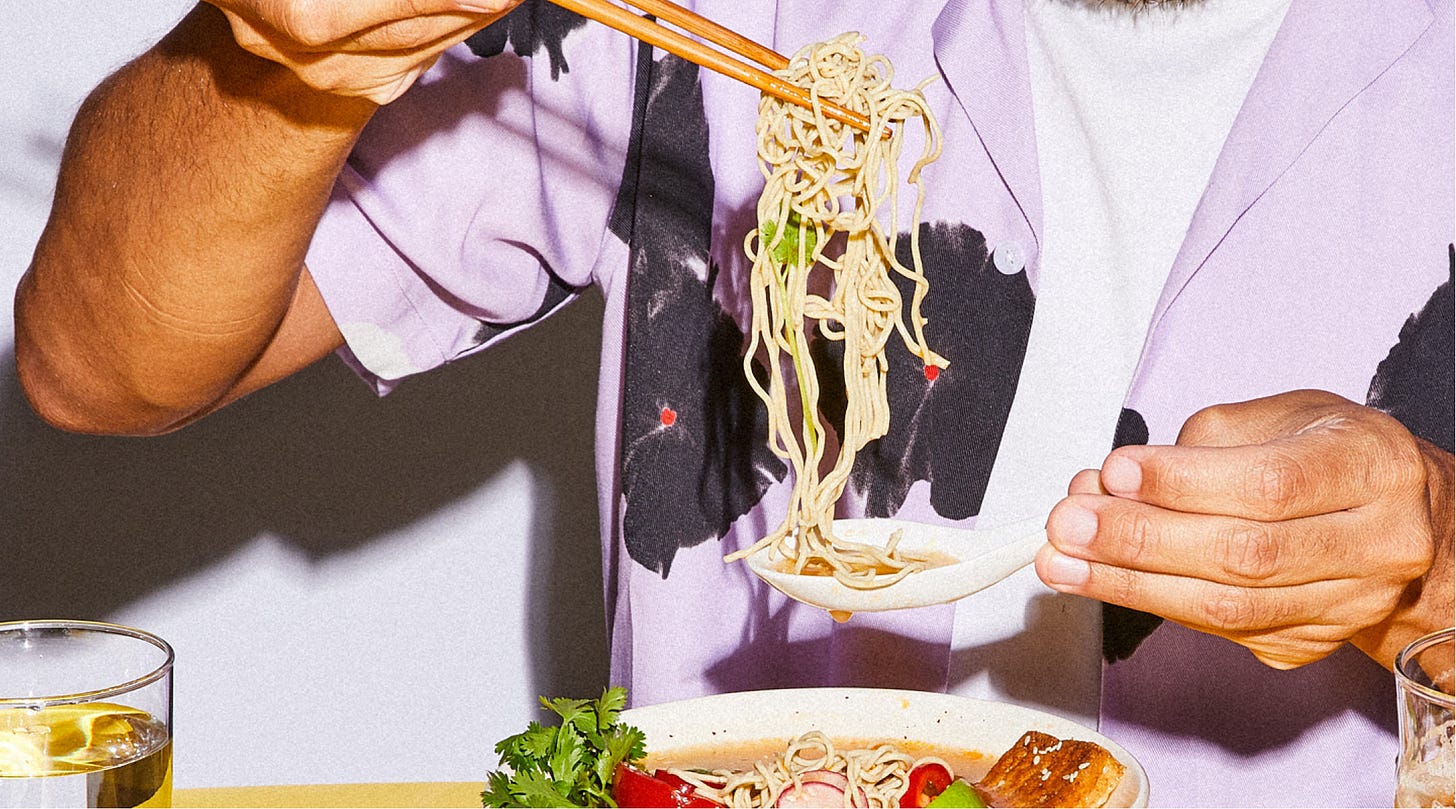The CEOs won't save us
Recent comments from Whole Foods' top executive remind us that our most pressing issues require leadership from a functioning federal government — not folks whose power derives from their wealth.
Yesterday Catherine Clifford at CNBC reported quotes from Whole Foods CEO John Mackey during a podcast interview last November. "I mean, honestly, we talk about health care. The best solution is not to need health care, Mackey said. "The best solution is to change the way people eat, the way they live, the lifestyle and diet. There's no reason why people shouldn't be healthy and have a longer healthspan. A bunch of drugs is not going to solve the problem."
Amazon purchased Whole Foods for $13.7 billion in 2017 to reclaim some of the brick-and-mortar business it disrupted. The company did not respond to a series of questions from The Supercreator including if the company shared Mackey's belief and why it offers its full-time employees access to company health care if their lifestyle decisions would prevent them from needing it in the first place. A spokesperson also did not respond when asked what Amazon would say to its part-time employees who do not have access to company health insurance and may feel frustrated by Mackey's comments. "Millions of people love Whole Foods Market because they offer the best natural and organic foods," Amazon CEO Jeff Bezos said at the time of the acquisition. "And they make it fun to eat healthy."
Mackey's recent interview isn't the first time he has gaslit us with controversial opinions. In 2009, he wrote "The Whole Foods Alternative to Obamacare," an article for The Wall Street Journal that advocated for less government oversight of health care in America. "This begins with the realization that every American adult is responsible for his or her own health," Mackey wrote. "We should take that responsibility very seriously and use our freedom to make wise lifestyle choices that will protect our health."
This worldview is a popular one among the elite. America claims to be a meritocracy but fails because we have unequal access to a level playing field. "American capitalism has displaced generations of Black people by redistributing economic resources from the have-nots to the haves and then deploying anti-democratic levers to maintain these distressing inequities," I wrote last summer. With this taken into consideration, the well-worn advice from the wealthy and powerful to pull ourselves up by the bootstraps and accept personal responsibility — without acknowledging how luck, race, class or any other external force contributed to where they are now — would be comical if it wasn't so dangerous.
One of the consequences of our culture's hero worship is that we accept as gospel the opinions of successful business people on policy issues of which they often own no expertise, despite their fiduciary responsibility to their shareholders over the public good. "For all sorts of psychological reasons, the more power an individual has, the less sensitive they become to the needs of other people and less inclined to seek out advice in making crucial decisions, and the less likely to take any advice when they actually get it," Dennis Tourish, author of The Dark Side of Transformational Leadership, said to Rebecca Jennings at Vox in 2018. "My own research also suggests that people in that position are reluctant to facilitate critical communication from other people who have less power in making those decisions, so eventually people give up trying to offer it."
This, along with comments like Mackey's, explains why CEOs won't save us — despite political right's preference to exchange philanthropy from the wealthy to address challenges across education, climate, criminal justice, or in this case, health care for tax cuts. "The problem: These elites are also fiercely protective of their own interests, which often makes them resistant to the kinds of sacrifices that would create real change," Anand Giridharadas, author of Winners Take All: The Elite Charade of Changing the World, said to Armando Arrieta of The New York Times last October. "For instance, they’re happy to donate money to a few schools (and be celebrated for their generosity), but they will lobby aggressively against a corporate tax increase that could mean more funding for tens of thousands of schools." And as I wrote last April, an over-reliance on philanthropy as a stand-in for action from public institutions is anti-democratic: "After all, tech executives are business people, not elected officials. So they’re under no obligation to serve the specific interests of or be held accountable by constituents in the same way a state or federal representative or senator would be."
Mackey's comments are gross when considered in a vacuum. But within the context of the pandemic, they sound even more out of touch. COVID-19 laid bare the enormous costs of care, racial and ethnic disparities in access to care and health outcomes and the fragile infrastructure of our public health network. And personally, I'm all too familiar with the shared stress among creators from not knowing if we'd have access to quality health care when we need it. These are issues that a functioning federal government should be leading on not folks whose power derives from their wealth. Because as Sarah Jones at Intelligencer reminds us: "The world looks different to the wealthy. If you have enough money, the pandemic is something you can afford to ignore."
In The Know
The Only Black Guy In the Office at Level on why being reunited with work has never felt so good:
Don’t get me wrong: I consider myself lucky to work for a company with a generous policy for paid time off that includes the final two weeks of the year. But this go-round was rough. “Home for the holidays” kinda loses its magic when you’ve been WFH for the majority of the year. Plus, I hadn’t realized how much the demands of the job had been shielding me from an existential crisis; with nothing keeping me busy, I wound up sleeping through the days and playing video games all night. I can’t believe I’m typing this, but I actually couldn’t wait for work to start again.
Quinta Jurecic at The Atlantic on how nihilism is destroying our democracy:
Members of Congress will gather tomorrow to count electoral votes and establish Joe Biden as the winner of the presidential election. Usually, this is a pro forma process without much excitement. But a handful of Republicans in the House and Senate are planning to feed President Donald Trump’s delusions of voter fraud by formally contesting the election—an action that has no chance of succeeding and that will not change the ultimate certification of the vote and Biden’s inauguration on January 20. These members of Congress, led by Senators Josh Hawley and Ted Cruz, appear to be calculating that the political boost from catering to the president is worth the cost to American democracy. Or, rather, they don’t care about democracy at all.
Elizabeth Wagmeister at Variety in conversation with Matt James on the if the impact of his role as the first Black Bachelor has dawned on him:
It has. And I felt that pressure, I’m not going to lie, initially. And then, I just doubled down on the way that I was raised and my upbringing, and that’s what has made this so easy because I can only be myself. That’s all I know how to be, and I can’t be a version of myself that I don’t know. I can’t be a version of myself that someone wants me to be because that wouldn’t be authentic, and the theme for me this whole season was just to be real and be authentic, and that’s what I did.
Daniel Markovitz at Harvard Business Review on why productivity is about systems not individuals:
The problem isn’t with the intrinsic logic of [popular productivity hacks]. It’s that they fail to account for the simple fact that most people don’t work in isolation. They work in complex organizations defined by interdependencies among people — and it’s often these interdependencies that have the greatest effect on personal productivity. You can be an email ninja, but with the explosion of email (not to mention instant messages, Twitter, LinkedIn, Slack, and countless other communication tools), you’ll never be fast enough to deal with all the incoming communication. Similarly, your personal urgent/important Eisenhower categories fall apart when the CEO asks you to do stop what you’re doing and handle something right away.
Ryan Broderick at Garbage Day on Bean Dad and Twitter:
It means that context collapse has gotten so bad and the scale of your trending algorithms are so completely out of whack that a total moron tweeting about beans can create the same level of discussion within your community as the Trump Georgia call. It means that your users are so desperate for your made up internet points that they would consider turning an extremely mundane story about using a can opener into a TWENTY-THREE tweet thread and are also so vicious and insane and bored that they would turn that thread about beans into a national scandal.
Maggie Lange at The Cut on why the way we make fitness resolutions is all wrong:
That’s kind of it, isn’t it? The days shift but then it’s still just us. The wild new challenges and grueling workout plans have us poised to do the most, which probably won’t last; while something boring that just works is also available to us. Feeling average: it’s the pretty nice, super unappreciated, balanced mid-point between great feats and great flops, which both happen all the time. Resolve nothing, babies! As you were!
Michael's Pick
immi Variety Pack ($57): You know I love my ramen, so I'm thrilled to support this new healthy instant-ramen brand from Kevin Lee — whom I got to know through my On Deck writing fellowship last year — and his co-founder Kevin Chanthasiriphan. (My money's on Black Garlic Chicken, with its notes of garlic, scallions, and umami, quickly becoming my favorite flavor).




